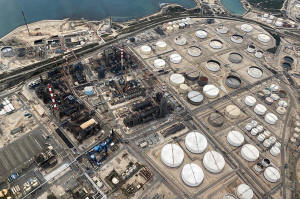|
Brent crude futures climbed $1.64, or 2.08%, to $80.66 a barrel
by 1041 GMT, while U.S. crude futures were at $76.38 a barrel,
up $1.55, or 2.07%.
Prices jumped after Libya's eastern-based Benghazi government
announced the closure of all oil fields on Monday, halting
production and exports.
"The biggest risk for oil market is probably a further drop in
Libyan oil production due to political tensions in the country,"
said analyst Giovanni Staunovo of Swiss bank UBS.
Oil prices opened the week higher after Hezbollah fired hundreds
of rockets and drones into Israel on Sunday and Israel's
military said it struck Lebanon with around 100 jets to thwart a
larger attack, in one of the biggest clashes in more than 10
months of border warfare.
The clash raised fears of wider conflict in the region.
"Geopolitical risk factors will likely influence the oil market
significantly," said Kelvin Wong, a senior market analyst at
OANDA in Singapore.
Monday's gains follow from both oil benchmarks gaining over 2%
on Friday after U.S. Federal Reserve Chair Jerome Powell
endorsed the start of interest rate cuts.
"The prospect of easing monetary policy boosted sentiment across
the commodity complex," ANZ analysts said in a note.
Investors remain cautious over the actions of the Organization
of Petroleum Exporting Countries (OPEC) and its allies, or
OPEC+, which has plans to raise output later this year, said
Priyanka Sachdeva, senior market analyst at Phillip Nova.
(Reporting by Robert Harvey in London, and Florence Tan and
Emily Chow in Singapore; Editing by Barbara Lewis and Bernadette
Baum)
[© 2024 Thomson Reuters. All rights
reserved.]
This material may not be published,
broadcast, rewritten or redistributed.
Thompson Reuters is solely responsible for this content.

|
|




